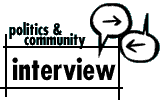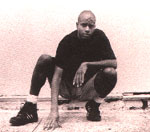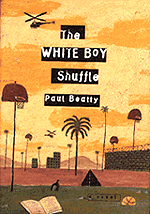
Paul Beatty
interviewed by Anthony Qaiyum on July 8, 1996

- "Shaun, Lance, Gunnar ..."
"Gunnar? Who's that?"
"You know, the funny, cool black guy."
-- from Paul Beatty's novel, "The White Boy Shuffle"

Tripod: You've written two critically acclaimed collections of poetry, and now you've written your first novel, "The White Boy Shuffle." Did you feel that you had something to say that you couldn't say in poetry?
PB: Hmmm. I don't think I looked at it like that. I think that I had this idea for a story and knew it was a novel and not a poem. I had been thinking about it for a long time. Actually, there is probably some overlap between the poetry and the book.
Tripod: Gunnar Kaufman, the protagonist, grows up in an all white area and then he moves to the 'hood where he has to learn all new social dynamics. Eventually he becomes an African-American poet messiah. Are you saying that background affects leadership and vision?
PB: [laughs] Yeah, I think I'm definitely saying that, but I'm not sure that I'm making a blanket statement about how that happens. First of all, he doesn't necessarily grow up in all white environment. He is there for awhile, but he also grows up in this Hillside community as well. They are two different phases of his growing up -- if he ever really grows up. I think part of the book is to challenge how people think about these things. People think that if there is going to be a messiah from whatever community -- Mexican-American, African-American, you know what I'm saying -- that they are probably going to come from those communities. And that may or may not be true. Malcolm X initially grew up in an all-white environment and then moved to Boston. Another interesting case is W. E. B. Du Bois. He was always talking about growing up in an all-white community and how it played a part in shaping his perspective of race relations in the U.S.
PB: I guess I am saying something about that, but I am not necessarily saying that the ability comes from spending time in that environment. I mean, what is your environment? The way that you are phrasing the question, you're automatically assuming that his natural habitat is one thing. I'm trying to say that natural habitat is wherever you happen to be. It changes. It's not that one person belongs in a certain context.
Tripod: Throughout the book the settings are humorous and somewhat cartoonish, but I felt like it intensified when Gunnar left Los Angeles and went to Boston to go to school. You went to Boston University as an undergraduate. How much of your portrait of Boston is based on actual experience?
PB: (laughs) There is the one bit about the rally. That is taken from an actual rally that I helped organize. My friends and I who went to school in Boston had this thing about how Boston is such a hard place to be black.
I had a hard time in Boston, I would have to say. I was there for a long time. I did my undergrad and started the Ph.D. in psychology there, which at some level was a mistake. I probably should have gotten out. I was just in Boston too long.
Tripod: Were you doing poetry at the time?
PB: Not really. I had dibbled and dabbled in it my junior and senior year just writing things to myself. I wasn't really writing anything, but I was reading and thinking about it. I had this one poem that I remember thinking about all through my third year of grad school. I am supposed to be paying attention, and I'm actually trying to construct this poem, even though I had never really written a poem before. Pretty soon, I lost interest in the psych thing and just really wanted to write.

PB: Yes, sometimes. For me there is a fine line, because I think people are doing things that they believe in. I am not trying to say, "Don't do anything" or that everything is ridiculous and absurd. I try to use the satire to get people think about how people do take themselves too seriously -- but at the expense of other things. All of a sudden it's this weird thing about identity as an academic or as a basketball coach or a gang member. You find this role and there is no escaping it sometimes. Using that, I am able to be absurd with it.
Tripod: You write both humorously and painfully about racism and its effects. Gunnar seems to suggest that suicide might be an honorable way out. Why did you choose suicide as the escape?
PB: I think that was the one premise that I had going into writing this book, that there was going to be this mass suicide movement. For me it's a very serious thing. We've had generations and centuries of diagnostic analysis of all sorts of plans, but the prescriptive end is always lacking in terms of "What the hell are we going to do?" Everyone is really good at proposing the questions and these weird solutions that for some reason haven't worked. I use suicide as the final solution. People say, "Fuck it. What's the most ridiculous thing we can do?"
But at the same time, it speaks to the fact that there is actually a high suicide rate among black men that is rarely talked about. It's always the other ways that we are supposedly always killing ourselves -- gang violence, drinking, drugs, and blah, blah, blah. I just think that mortality is a very real subject for people, black people especially.
Tripod: If this were a movie, this mass suicide idea would probably cause protests and uproar.
PB: Yeah, it probably would.
Tripod: Does that bother you at all?
PB: I get nervous when people treat the book as a manifesto, as if I'm advocating this. It's just an idea that has become a story. It's the same thing that happens in rock and roll and hip-hop. If the band espouses this philosophy then they're supposed to be this way. If you write death metal then you must be a devil worshipper and blah, blah, blah, blah. If you write gangsta rap then you're supposed to be this hardened criminal. There is a certain restriction on artistic freedom that people just force. We are constantly talking about being real and all this other bullshit.
PB: Oooh. I don't think that it is an optimistic thing. For me it is almost like a blues reference. There is this tradition of the blues being very sad and optimistic at the same time. I am still here. I'm complaining, but I'm still here. I think that that's part of it. It's this weird kind of resignation. It's like saying, "OK I have nothing more to worry about so I am going to drink myself to death." Kind of like that movie "Leaving Las Vegas." Nicholas Cage has made his decision and nothing is going to stop him from it. And he's like, "Okay, fine. [laughs] Despite the fact that I'm happy for the first time ever, it's just not quite enough." It's kind of the same reaction.
Tripod: So does your book offer any hope? At the end of the book one gets a sense that it has been a long and fun roller coaster ride, but now what?
PB: I like that. The roller coaster comes to a stop, and you kind of feel funny. You want to go again, you kind of don't want to go again, you're kind of going nowhere. I believe that things are bleak and I consider myself somewhat of a realist in regards to the situation of the world. I really don't think that means that there shouldn't be any action. The character, Gunnar, keeps going and going and just paints himself into a corner, not even sure why he has done it, except that nothing is happening for him in the way that he wanted to have happen. He sticks with his convictions, more or less. Sometimes you are just backed up against the wall and there is nowhere else to go. You spend so much time defending yourself that you never attack the things you have to attack.
